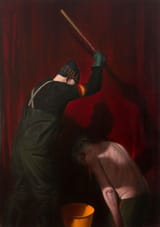Search Results
6/15/2025, 11:20:50 PM
>>95876122
I've been running and playing UA3 for the last five years.
The dice system rewards acting like a crazy person and reinforces the game's core theme that being an obsessive weirdo makes you more powerful. It's a d100 game so your base chance to succeed is shit, but you can boost it by acting with your Obsession and Passions (Rage, Noble, Fear). These let you reroll or flip failed results if you do the action in a way that satisfies the underlying urge.
The combat system is one of my favorite in any RPG. At its core it's the usual blocks of HP chopping at each other, but when you layer on the psychological stress system things get interesting. If someone isn't sufficiently hardened in the appropriate stress meter then there's a chance they lose their cool when they get attacked with a weapon, when they witness a terrifying magical event... It's hypothetically possible to get instakilled with a gun or direct damage spell but the more likely outcome is that fights end when someone breaks and either runs for it or gives up. What's really cool is you can use the Coercion system, which is the game's social combat system, in actual physical combat. The more you know about the target's wants and desires the easier it is to push their buttons and make them lose control. When you get it right it feels like Brainiac telling Superman to put the whole world in a bottle.
The biggest barrier to entry is the game assumes you're already familiar with the lore from prior eds. The book attempts to explain the world and mythos but like many Kickstarted legacy games it was written for superfans of the series and it shows. Normally lore doesn't matter but in UA3 it's a problem because the default mode of play is for the GM and players to collaboratively assemble the campaign premise and setting together. When it works it's magical, but it's a heavy creative lift if you're just starting out. You basically need the 2e setting books to make it happen.
I've been running and playing UA3 for the last five years.
The dice system rewards acting like a crazy person and reinforces the game's core theme that being an obsessive weirdo makes you more powerful. It's a d100 game so your base chance to succeed is shit, but you can boost it by acting with your Obsession and Passions (Rage, Noble, Fear). These let you reroll or flip failed results if you do the action in a way that satisfies the underlying urge.
The combat system is one of my favorite in any RPG. At its core it's the usual blocks of HP chopping at each other, but when you layer on the psychological stress system things get interesting. If someone isn't sufficiently hardened in the appropriate stress meter then there's a chance they lose their cool when they get attacked with a weapon, when they witness a terrifying magical event... It's hypothetically possible to get instakilled with a gun or direct damage spell but the more likely outcome is that fights end when someone breaks and either runs for it or gives up. What's really cool is you can use the Coercion system, which is the game's social combat system, in actual physical combat. The more you know about the target's wants and desires the easier it is to push their buttons and make them lose control. When you get it right it feels like Brainiac telling Superman to put the whole world in a bottle.
The biggest barrier to entry is the game assumes you're already familiar with the lore from prior eds. The book attempts to explain the world and mythos but like many Kickstarted legacy games it was written for superfans of the series and it shows. Normally lore doesn't matter but in UA3 it's a problem because the default mode of play is for the GM and players to collaboratively assemble the campaign premise and setting together. When it works it's magical, but it's a heavy creative lift if you're just starting out. You basically need the 2e setting books to make it happen.
Page 1
